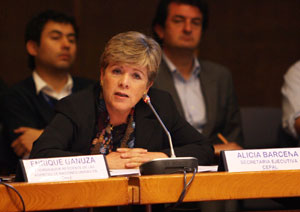"Development Should Be the Core of the G-20 Agenda"
Alicia Bárcena inaugurated an international seminar that examines the socio-economic situation of the region and the world in light of the G-20 meeting set for mid-November in South Korea.

(26 October 2010) "Growth is not the same as development. This is why the G-20 agenda should not only include policies to prevent future crises and foment reactivation - it should also place the analysis of strategies for long-term, sustainable and inclusive development at its core," said ECLAC Executive Secretary Alicia Bárcena during the inauguration of an international seminar.
"This implies a thorough discussion on the design of the global economic and financial architecture, taking into account the diversity and heterogeneity of the countries that compose the world economy and the new challenges of the 21st century," she said at the opening of the seminar Recent Development Strategies in Government Plans, held at ECLAC headquarters in Santiago.
The event, which ends today, was organized jointly by ECLAC and the Institute of Applied Economic Research (IPEA) of Brazil and is supported by the Government of South Korea.
During the seminar, experts from several continents will analyze the current socio-economic scenario in the region and the world and agree on proposals for the next G-20 meeting to be held in Gyeongju, South Korea, on 11-12 November.
The G-20, or Group of 20, is a cooperation forum on the global financial system composed of the seven most industrialized countries in the world plus Russia (G-8), the European Union bloc and 11 recently industrialized countries, among them Mexico and Brazil.
The Executive Secretary of ECLAC said that any agenda for development with equality requires closing the internal and external productivity gaps, considering employment as the master key to reducing inequality, reaching a labour agreement that boosts economic growth while protecting workers, and implementing active and redistributive social policies that ensure universal social protection.
Also participating in the inauguration of the seminar were the President of IPEA, Márcio Pochman, the Ambassador of the Republic of South Korea in Chile, Myung-soo Jang, and the Deputy Executive Secretary of ECLAC, Antonio Prado.
Speakers and panelists include Jomo Kwame Sundaram, Assistant Secretary-General of the United Nations on Economic and Social Affairs, José Antonio Ocampo, professor of Columbia University and former Assistant Secretary-General of the United Nations on Economic and Social Affairs, and Daniel Titelman, Chief of the Development Studies Unit at ECLAC.
For enquiries, please contact ECLAC's Public Information and Web Services Section.
Email: dpisantiago@cepal.org; telephone: (56-2) 210-2040.
Country(ies)
-
Brazil
-
Korea, Republic of
Contact
Public Information Unit
- prensa@cepal.org
- (56 2) 2210 2040